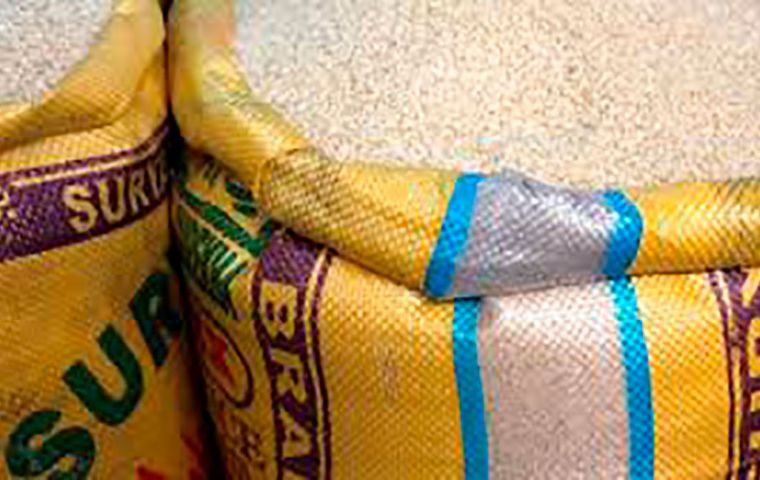MercoPress. South Atlantic News Agency
Brazilian rice exports booming; challenge for all three Mercosur partners
 With Q1 results, Abiarroz expects foreign sales of the cereal to reach at least 1.4 million t in 2022, surpassing the volume of around 1.2 million obtained in 2021.
With Q1 results, Abiarroz expects foreign sales of the cereal to reach at least 1.4 million t in 2022, surpassing the volume of around 1.2 million obtained in 2021. Brazilian rice exports (husk base) totaled 451.3 thousand tones during the first quarter, more than double the same period in 2021 when 207.7 thousand tons were shipped, reports the Brazilian Rice Industry Association (Abiarroz).
With the result so far from January to March, the rice association expects foreign sales of the cereal to reach at least 1.4 million t in 2022, surpassing the volume of around 1.2 million obtained in 2021.
Also according to figures released by Abiarroz, based on data from the Ministry of Economy, in March alone, exports of the grain totaled 180.3 thousand tons compared to 104.4 thousand in the same month of 2021. During April the main markets for processed rice were Senegal, Peru, Venezuela, Gambia, and Sierra Leone.
Data released by Abiarroz also show that Brazil imported 106,800 tons of rice last month compared to 73,500 tons in March 2021.
Although good news for Brazilian rice farmers, it is not necessarily the same for Mercosur partners and competitors since traditionally Brazil would absorb surplus production from Argentina, Uruguay and Paraguay. With a current global bull market for cereals and rice in particular, the situation should not be pressing for Mercosur partners, but if world markets return to a mild demand, the situation could turn out to be complicated for Argentina and Paraguay. Although not so much for Uruguayan rice which is considered a very high quality produce.
“Rice exports in Q1 were good compared to 2021, but shipments of processed rice still need to grow more”, emphasized the director of International Affairs at Abiarroz, Gustavo Trevisan. “From January to March, most of the volume exported was broken rice and husk”.
Trevisan also points out that with the lack of containers, worsened recently with the lockdown in Shanghai (China), where the world’s largest port is located, it continues to hamper and delay foreign sales of Brazilian rice:
“The pandemic in China has increased the cost of our exports due to the difficulty of renting containers, particularly regarding our higher added value items, such as white processed rice and parboiled rice.”
However Abiarroz’s Export Manager, Carolina Matos, sees a more promising scenario for Brazilian rice in the foreign market in 2022. “With the end of the travel restrictions, --even gradually and not homogeneous--, imposed by the covid-19 pandemic, we are intensifying international promotion. In addition, there is a growing interest from rice industries that do not yet export to enter the world market.”
According to Ms Matos, Brazilian Rice, an export promotion project, began to reach new European markets in 2022. “Since January, the sector has been increasing its exports to Europe, and two non-traditional destinations have entered the export agenda: Portugal and Spain, focusing on husked rice.
“Companies are already doing their part to take advantage of the Mercosur-EU agreement, seeking new customers in Europe. However, the completion and swift entry into effect of the Mercosur-EU agreement is required for us to consolidate our presence in new markets,” Abiarroz export manager underlined.




Top Comments
Disclaimer & comment rulesCommenting for this story is now closed.
If you have a Facebook account, become a fan and comment on our Facebook Page!